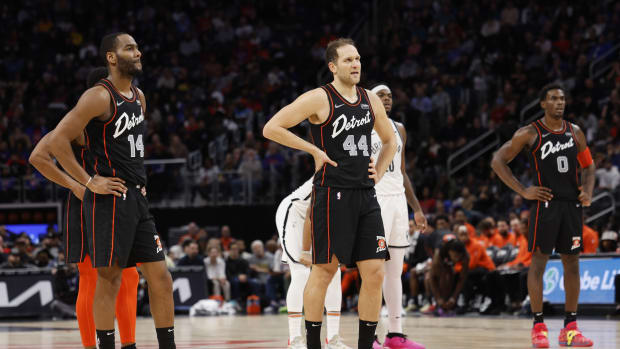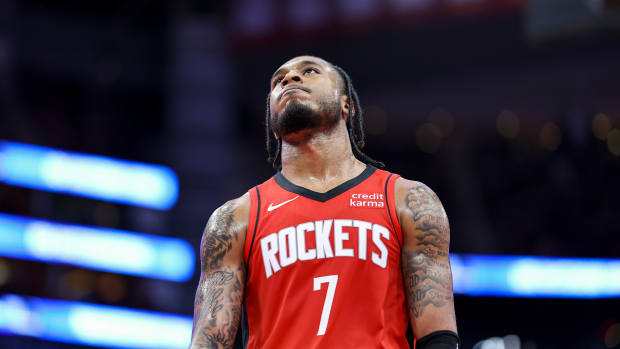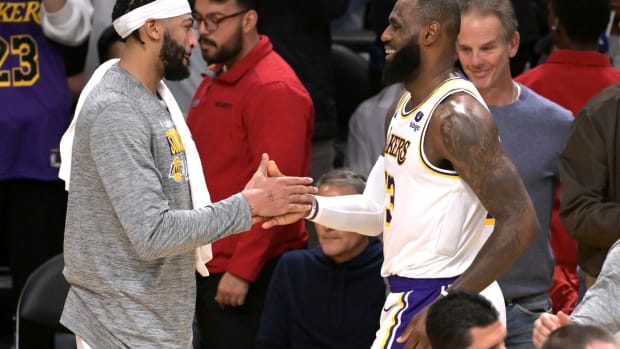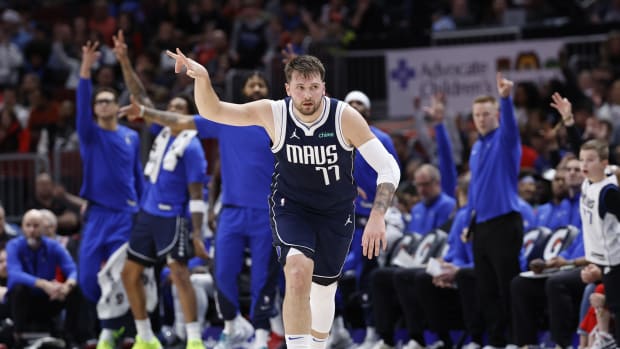2018-19 NBA Midseason Awards: Can James Harden Win His Second Consecutive MVP?
With half of the 2018-19 season in the books, the NBA’s award races are in full swing. To even get to this point required more than the usual twists and turns; one could argue that as many as five players have had their stay as the favorite for MVP already, and there are still miles to go before anything is actually decided. Here’s where things stand with half the scheduled regular season games accounted for.
Most Valuable Player: James Harden
Runners-up: Giannis Antetokounmpo (Bucks), Stephen Curry (Warriors), LeBron James (Lakers), Paul George (Thunder)
There’s officially a new front-runner for MVP, and all it took was a season-saving run for Houston in which Harden averaged 40.2 points, 9.6 assists, and 6.9 rebounds per game for nearly a month straight. For as wonderful as Antetotokounmpo has been on both sides of the ball, there’s just no denying what Harden brings to the game in pure creation. No other player in the league is doing quite so much with quite so little creative help. Some of that is a function of Houston’s design, though with Chris Paul and Eric Gordon having missed a combined 26 games to date, the revised blueprint has made Harden an isolated, load-bearing pillar. Giannis may be surrounded by shooters, but every one of his fellow starters can put the ball on the floor to help create. Houston has Harden alone, dancing at the top of the floor, until his opponents submit.
This is an approach that, over a long enough term, would undoubtedly take its toll. Houston traded for (and re-signed) Paul to avoid this very outcome, and yet in his absence has turned to it as a survival tactic. The results are inarguable. Not only has the energy within and around the Rockets changed dramatically since Harden’s takeover, but his steering has kept Houston squarely—and somewhat improbably—in the offensive elite. Since Paul’s injury, the Rockets are 8-3 with wins over the top three teams in the conference. Harden made it possible.
FISCHER: Stretch Provision Comes with Cash and Complication
The standings in the West seem to be remade every night, given that a single loss could take a team from fourth place to seventh. Harden, in a sense, has bought the Rockets time. His play gives the Rockets cover as they sort out their still-porous defense. It allows Paul, who is still a few weeks away, all the time he needs to resolve a persistent injury. Other teams don’t have these luxuries. They scrap and toil, grasping for any sense of competitive stability. Harden offers it as a natural byproduct. We would call his play of late a “revelation,” save that he’s doing the same things he’s done for years, only to a more astonishing degree.
Coach of the Year: Mike Budenholzer (Bucks)
Runners-up: Doc Rivers, (Clippers), Nate McMillan, (Pacers)
As Jason Kidd and Joe Prunty showed in previous seasons, it’s not enough just to have a superstar like Antetokounmpo at the heart of your roster. Becoming a contender requires unlocking his talents in a certain way, and it was Budenholzer’s vision that turned the key. Every defense in the league attempts to wall off Antetokounmpo from the basket, and yet the spacing of Milwaukee’s offense makes it impossible. Let’s give credit where it’s due—first to Antetokounmpo for neutralizing so many of the opponents in his path, and then to the coach who has best positioned him to succeed.
The Budenholzer Effect has been fairly comprehensive. Milwaukee runs a healthier base rotation than it did last season with largely the same roster. It was Budenholzer who reconceptualized Brook Lopez, who was marginalized and subsequently disregarded by the Lakers last season, as a volume three-point shooter. Eric Bledsoe is more engaged and effective under Budenholzer’s watch than he’s been in five years. Revising the Bucks’ offensive priorities has given Khris Middleton a leaner shot diet that serves him well. Even D.J. Wilson and Sterling Brown have become useful players in their own right, shoring up the back of the depth chart. There are a number of qualified candidates for this award, as always, but none who have helped their teams so comprehensively.
Sixth Man of the Year: Domantas Sabonis (Pacers)
Runners-up: Montrezl Harrell, (Clippers), Spencer Dinwiddie (Nets)
No big has won Sixth Man of the Year since Lamar Odom in 2011, though that should change now that Sabonis and Harrell have established themselves as worthy favorites*. The trick is choosing between them. Both are prolific, efficient players who make incredibly few mistakes. Harrell is the classic hustle player, evolved—capable now of not only outworking opponents, but outsmarting them. Sabonis plays at a calmer speed that is no less effective, dismantling opposing defenses from the inside out. Both the Clippers and Pacers, respectively, are at their best when Harrell and Sabonis are on the floor. Their choice to bring them off the bench is purely a matter of logistics.
NADKARNI: NBA Free Agency Is Not Always Your Friend
Sabonis may hold a slight lead on the grounds of his role, rebounding, and defense. The latter isn’t exactly a strength relative to the rest of the league, though it is here. If nothing else, Sabonis has shown that he can carry his weight in one of the league’s best defenses, all without any one standout defender making up for his limitations. Harrell, by contrast, plays alongside plenty of capable individual defenders on a team that can’t seem to get enough stops. It’s a contextual difference, but a difference all the same. And for as captivating as Harrell is on offense, Sabonis provides a greater structure—a mechanism through which his team can actually run its stuff. Those factors, combined with a notable advantage on the glass, creates some slight separation between the two candidates.
*At the moment, we’re denied a third big in the running as the Pelicans’ Julius Randle has started literally one too many games to be eligible for the award. It’s a shame, but one that could resolve itself if New Orleans can get healthy enough to bring Randle off the bench again.
Defensive Player of the Year: Paul George (Thunder)
Runners-up: Robert Covington, (Timberwolves), Steven Adams (Thunder)
This has been a brilliant season by George from top to bottom, and perhaps most impressive on defense. It can be difficult for wing players to challenge for Defensive Player of the Year due to the nature of their responsibilities; some are siloed in such a way that their impact is overly specific. Not George (nor, for that matter, Covington). Oklahoma City relies on George to not only lock down some of the league’s most dangerous perimeter scorers, but to disrupt the process that might help them create. When a set calls for the ball to pass through his side of the floor, George will deny it to the point of detonating the play altogether. Even if a pass does eventually get through, George will have drained the shot clock, rushing the next action in sequence.
ROLLINS: Stephen Curry and the Warriors Are Scorching Hot
Opponents dread not only seeing George matched up in front of them, but seeing him around at all. His presence alone projects the constant threat of a turnover. George himself ranks eighth in the league in steal percentage, but his impact is felt throughout Oklahoma City’s defense, which turns its opponents over more than any other in the league. When Russell Westbrook jumps a passing lane, it’s often because George was able to get a deflection after blanketing the man with the ball. When a guard fumbles the ball away to Steven Adams, it’s in part because they felt George recovering from behind, ready to lunge back into the play. No other player in the league has had a greater effect on the timing and comfort of his opponents than George, which is an incredible thing when you consider the high-powered offenses he runs up against.
Rookie of the Year: Luka Dončić, Mavericks
Runners-up: Jaren Jackson Jr., (Grizzlies), Deandre Ayton (Suns)
Since we last checked in on the award races, Dončić’s grasp on the Rookie of the Year has only tightened and his legend has only grown. There is only one rookie in the league who is already acting the part of a franchise player, down to taking over games and dominating in crunch time. Even if Dončić wasn’t leading all rookies in scoring, improbably efficient while taking highly difficult shots, and a mature playmaker in his own right, Dončić would probably earn the ROY on command alone. The Mavericks are largely a team of veterans, and those veterans increasingly look to Dončić to lead the way. Their acceptance is the tell.
MAHONEY: Dončić Continues ROY Pursuit
To be honest, the real intrigue in this award race comes with the rest of the ballot. Jackson was the early leader to finish second to Dončić, but Ayton, the No. 1 overall pick, has improved enough since the start of the season to give him an honest run. Both are similarly productive after adjusting for minutes and pace (Jackson actually scores slightly more, in the end) and similarly efficient after accounting for three-pointers and free throws. Voters must account for their different flavors of offense (a matter of preference, in some sense) while balancing Jackson’s edge in defensive coverage with Ayton’s superior rebounding. Jackson has an edge at the moment, though Ayton could well catch him.
Most Improved Player: Pascal Siakam, Raptors
Runners-up: Derrick Rose (Timberwolves), Marcus Morris (Celtics)
Siakam isn’t just a different player this season, but a wholly more confident one—secure in even the more recent additions to his game. There was no real trial period. Only the Siakam we saw last season and the more refined version we see now, somehow improved in so many different aspects of the game. Typically, I’d prefer not to give this award to a player in their second or third season, save for extreme cases. Siakam is one. He’s nearly 25 years old, putting him on a different developmental timeline from a player of his experience level. He’s playing a high-leverage role for one of the best teams in the league, and in most regards exceeding even his own team’s expectations for him. Siakam was useful already, but with the way he’s attacking off the dribble, defending, and making plays, he has the chance to register a different level of impact on the stage that matters most.
MANNIX: Can the Raptors Convince Kawhi to Stay in Toronto?
A nod though, is owed to Rose and Morris, both of whom have impressed. Rose has to be one of the most unconventional candidates for this award in its history: a former MVP turned deep reserve who has reinvented himself as a sixth man. The shoot-first bench guard is a classic archetype, and Rose has, against all odds, fashioned himself as the most effective kind. He’s rectified some of his weaknesses (Rose is currently fourth in the league in three-point percentage), modified his approach, and found a way to assert himself without wresting away control of the offense. It’s an evolution that literally saved Rose’s career. Morris has long operated in a more moderate and less spectacular space, though now he’s outperforming the likes of Gordon Hayward and Jaylen Brown. How is he shooting so well? How did a career bench player wind up as Boston’s third (or even second?) most consistent player? This is a wild development, even from a player who was already helpful for the Celtics last season.








































